April 2018
April 20, 2018
Cowvertising
$500 a year to put your ad on the side of a cow.
Twin Falls Times-News - Apr 8, 1984

Detroit Free Press - Apr 13, 1984
Posted By: Alex - Fri Apr 20, 2018 -
Comments (2)
Category: Advertising, Farming, Cows, 1980s
Follies of the Madmen #360
Posted By: Paul - Fri Apr 20, 2018 -
Comments (2)
Category: Annoying Things, Anthropomorphism, Business, Advertising, Corporate Mascots, Icons and Spokesbeings, Food, 1970s
April 19, 2018
Have an airport nice day
In 1991, the New York Port Authority launched a $90,000 program to teach its employees to be friendlier to tourists. As part of this program employees "were encouraged to repeat the following mantra as a send-off to visitors: 'Thank you. Have an airport nice day.'"
Minneapolis Star Tribune - Aug 12, 1991
Posted By: Alex - Thu Apr 19, 2018 -
Comments (2)
Category: Bombast, Bloviation and Pretentiousness, 1990s
Kotex Kotique
"Kotique?"
Original ad here.
Posted By: Paul - Thu Apr 19, 2018 -
Comments (1)
Category: Business, Advertising, Hygiene, 1970s, Women
April 18, 2018
Munch Meter
An invention that measures how much a cow has eaten by recording the motion of its head while it eats.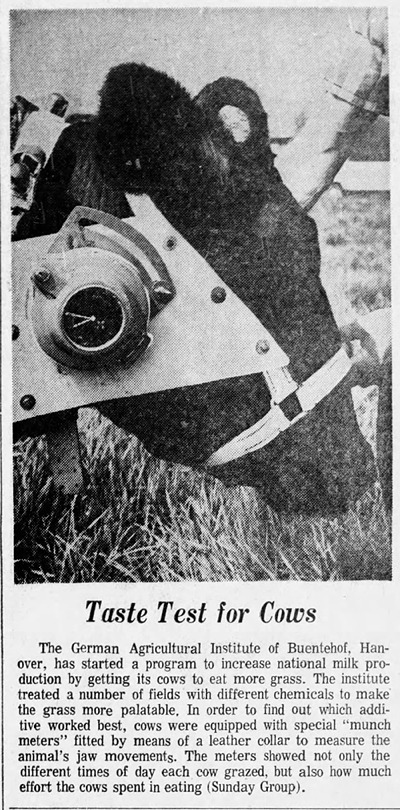
Hartford Courant - Sep 14, 1972
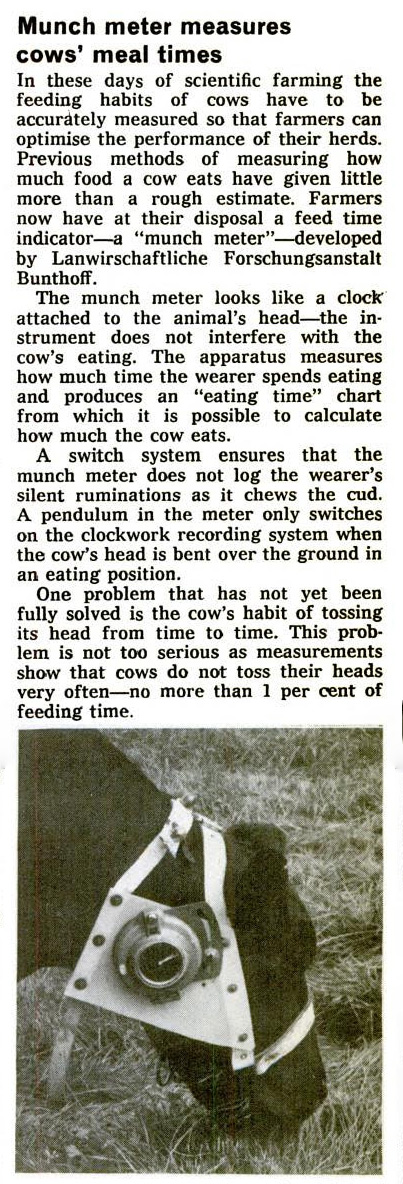
Posted By: Alex - Wed Apr 18, 2018 -
Comments (1)
Category: Animals, Farming, Inventions, 1970s
Maniac Electronic Game
The German presentation makes the game even better!
Posted By: Paul - Wed Apr 18, 2018 -
Comments (0)
Category: Games, Technology, 1970s
April 17, 2018
Inflatable Underpants
I wonder where Katsuo Katugoru was during the big 2011 tsunami... if he got a chance to use his invention.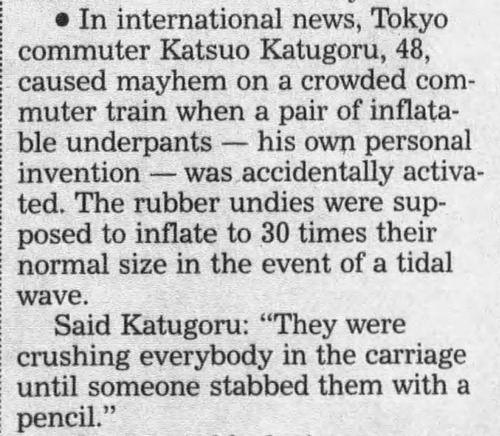
Orlando Sentinel - Aug 23, 1998
Update: I've concluded that Katsuo's inflatable underpants were fake news. Never happened. Columnist Mark Gibbs called it out as such in his May 4, 1998 column in Network World magazine. He also offered some prescient thoughts about the emergence and possible consequences of the fake-news phenomenon:
— Unsubstantiated story carried March 3, 1998, by London's Daily Telegraph, National Public Radio and many other serious news organizations.
What's interesting about this story (other than the weirdness) is the coverage the story received. According to some reports, The Associated Press sourced it, but no one has been able to find any AP reference. You have to wonder how the likes of NPR and the Daily Telegraph could run with it.
What the event illustrates is a phenomenon that will become increasingly common — the Internet raising gossip, jokes and misinformation to the status of truth. This is what I call "anti-data." Anti-data is not the opposite of data, rather it is the stuff that dilutes and invalidates the data you need.
Part of the reason anti-data exists is because the Internet supports the rapid transfer of huge amounts of what we'll call, for the sake of argument, "news." Way back in 1967, Marshall McLuhan noted the consequence of speedy news delivery as a general trend of modern media in "The Medium is the Message: An Inventory of Effects," (p. 63):
Information pours upon us, instantaneously and continuously. As soon as information is acquired, it is very rapidly replaced by still newer information. Our electrically configured world has forced us to move from the habit of data classification to the mode of pattern recognition.
The Internet amplifies this effect and applies it not only to news but also to intelligence about markets, people and business concerns in general.
To corporations, this should be a great concern. As your employees begin to rely on pattern recognition over data analysis, generally their judgment will become less consistent.
Their correct conclusions may well become more accurate, but their wrong ones will tend toward the catastrophic. These extremes might average the same as prior judgments, but the fact that the highs are stellar and the lows, abysmal, will induce chaotic behavior.
Posted By: Alex - Tue Apr 17, 2018 -
Comments (5)
Category: Inventions, Underwear, 1990s
Beyond the Map
Read more here.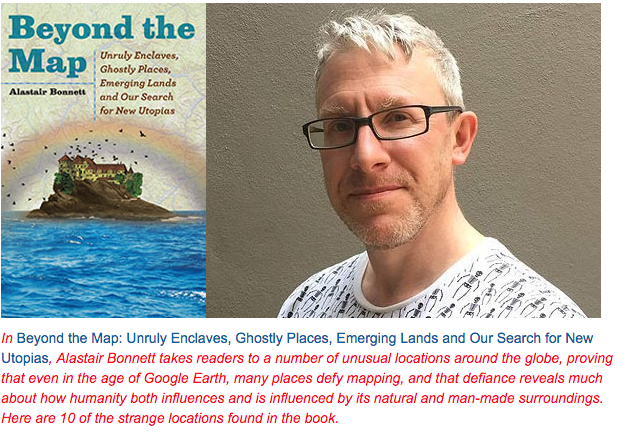

Posted By: Paul - Tue Apr 17, 2018 -
Comments (0)
Category: Weird Studies and Guides, World, Books
April 16, 2018
Do-It-Yourself Coffin/Bookcase
"For $9.95 he'll mail you plans for a do-it-yourself coffin that also works as a bookcase."I guess when you die your family wouldn't even need to remove the books. Just throw you in there with them.
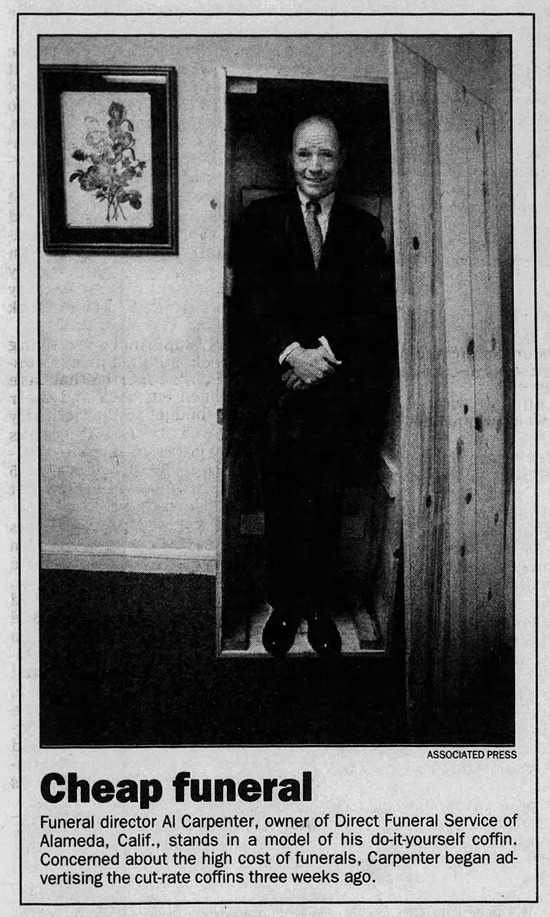
Oshkosh Northwestern - Mar 23, 1993

Lincoln Star - Mar 23, 1993
Posted By: Alex - Mon Apr 16, 2018 -
Comments (4)
Category: Death, Books, 1990s
Astounding Beauty Clay
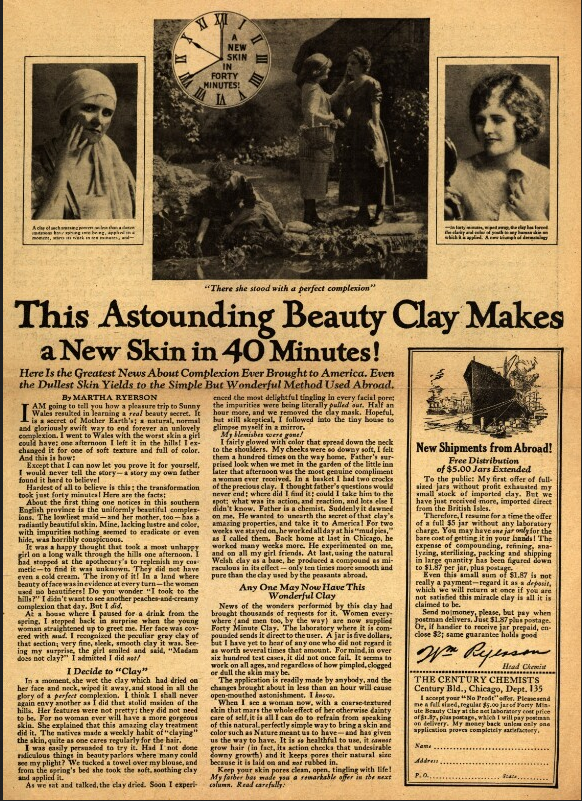
Go here for expandable version where text can be read.
Posted By: Paul - Mon Apr 16, 2018 -
Comments (3)
Category: Beauty, Ugliness and Other Aesthetic Issues, Advertising, 1920s
| Get WU Posts by Email | |
|---|---|

| Who We Are |
|---|
| Alex Boese Alex is the creator and curator of the Museum of Hoaxes. He's also the author of various weird, non-fiction books such as Elephants on Acid. Paul Di Filippo Paul has been paid to put weird ideas into fictional form for over thirty years, in his career as a noted science fiction writer. He has recently begun blogging on many curious topics with three fellow writers at The Inferior 4+1. Chuck Shepherd Chuck is the purveyor of News of the Weird, the syndicated column which for decades has set the gold-standard for reporting on oddities and the bizarre. Our banner was drawn by the legendary underground cartoonist Rick Altergott. Contact Us |

